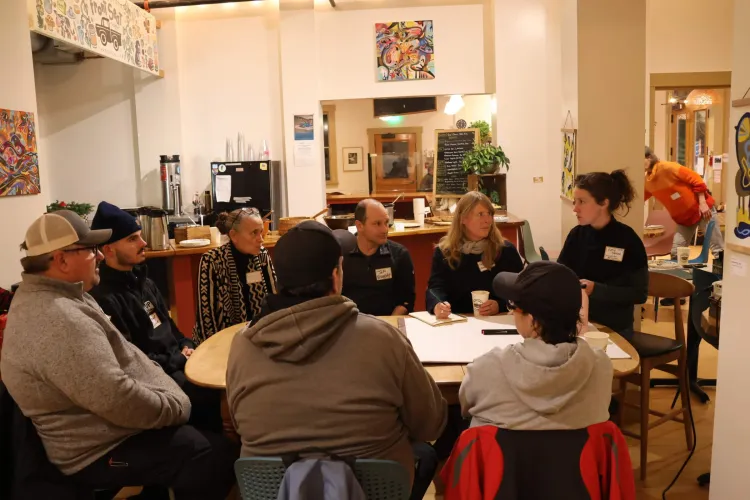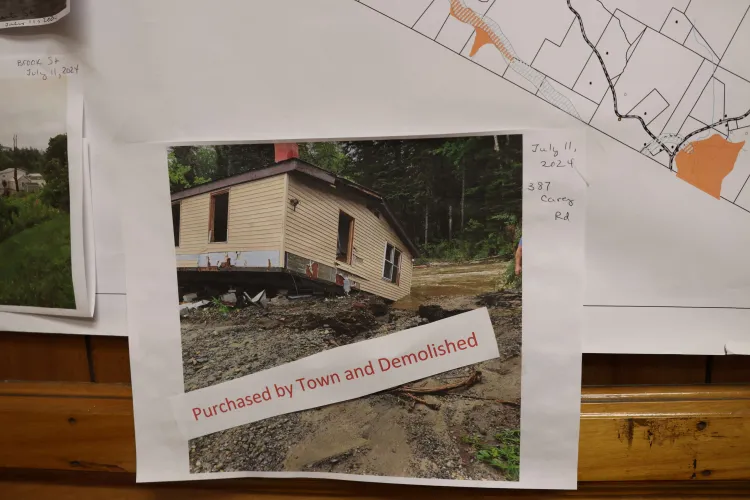The questions “who is at the table” and “who is missing a seat at the table” are often invoked in conversations about collaboration, participatory research, and justice-oriented work. The table serves as a stand-in for the places, both material and virtual, where conversations happen and decisions are made about what changes are needed and how that change should be pursued. In considering the proverbial table, we should also ask, what motivates us to gather? Who sets the table? And crucially, how do people need to show up at the table to advance collaborations and just futures?

Within participatory and collaborative research processes, funders often play a significant role in inviting people to the table: setting parameters around who can convene and establishing towards what end. In the fall of 2024, the Leahy Institute for Rural Partnerships put out a call for letters of interest for their inaugural partnership grants for new community-university collaborations focused within Vermont. Through this process, the Institute for Agroecology, Center for an Agricultural Economy, Northeast Kingdom Organizing, and Rural Vermont were invited to submit a collective grant proposal.
In discussing our respective organizational foci – food systems infrastructure (CAE), rural community organizing (NEKO), agrarian grassroots organizing (Rural Vermont), and agroecology (IFA) – we identified Just Transitions as a framework. We believe that Just Transitions could help us understand how our individual areas of work are interrelated and how we might relate as organizations whose missions and values seemed to align. With funding from the Leahy Institute, we had one year to explore the potential for a long-term partnership to advance Just Transitions in Vermont’s Northeast Kingdom. More details on our year of work, including outputs, can be found here.
Here, we reflect on our experiences as researchers participating in a collaborative process that represents an intentionally relational approach to research.
In other words, we are asking what it means to change the way that communities and universities often encounter each other around the table.
As researchers, what is our role in helping set the table to enable long-term collaborations? What relational and reflexive practices and ways of knowing do we need to cultivate to engage in long-term collaboration? And most importantly, how can research collaborations live into more just and resilient futures?
Considering these questions within the context of our first year partnering with CAE, NEKO and Rural Vermont helped us crystalize insights related to our internal approach as researchers engaging in collaborative work. When we first sat down with our partners, we came prepared to listen and to facilitate a process that brought together lots of different ways of knowing. Around the table we saw relationships, place-based knowledge (including historical perspective and a keen sense of current issues), experience with grassroots organizing, community-based food systems, and participatory research. Based on our experiences in other collaborative and participatory processes, we knew the importance of creating a foundation to build on – including spending time upfront articulating shared values, agreeing to ways of working together, and building trust – which we can also understand as creating the conditions for working together or ‘setting the table.’
Trust, in particular, is a key condition for meaningful collaboration, and ‘moving at the speed of trust’ is another phrase often invoked in discussions about collaborative research. But what does that actually entail? In this process, we found that establishing trust required us to move slowly, let go of pre-conceived notions of progress, make space for emergence, and physically show up around various community tables over and over again. It may seem small, but the gesture of coming to the community’s tables instead of expecting that they would come to ours was an intentional shift in power. It centered the work firmly on our partners’ expertise and the needs of their communities and demonstrated our commitment to learning the territory. Seated around our partners’ tables, we made a point of listening to not only what our partners said, but also what went unsaid. When we made proposals about how to move the work forward, we listened to what people thought, but we also looked for cues about how they felt about those proposals. In short, a relational approach to research requires a high degree of emotional intelligence. By this we mean, the ability to recognize and understand emotions–both one’s own and those of others–and the willingness to shift actions and interpersonal dynamics in response.
Emotional intelligence is not often explicitly named as integral to participatory and collaborative research processes. Yet, in the context of agroecology, where relationships and the weaving together of many ways of knowing are at the heart of the work, this absence feels essential to tend. Recognizing emotional intelligence alongside other forms of knowledge invites us to see care not as peripheral, but as foundational to the futures that Just Transitions call us to envision and enact. There is so much to learn learn from existing research efforts (the work of Shawn Wilson and the researchers of the Sabr Care Collective, to only name a few) that align with Indigenous, activist, and organizing traditions that center care–as a relational ethic, a lever for social and economic change, and a vital practice for movement-building.
Based on our experience, care and emotional intelligence must underpin processes and relationships within research and collaborations that aim to advance Just Transitions.
This is not only about naming care as a value but also about practicing it in the way we work together. Attending to process—treating it as sacred, not secondary—is essential. Just as agroecology insists on valuing and weaving together many forms of knowledge, so too must collaborative research. We must intertwine multiple ways of knowing and being, not only in the content of our work but also in how we organize and sustain our relationships. As one partner reflected in our final debrief, “trust isn’t a given—it’s something we have to build.”
Our willingness to get vulnerable—to acknowledge blind spots and invite critical feedback—created space for our partners to do the same. Thanks to this mutual openness, we were able to explore not only the external challenges of transition also the internal and organizational dynamics that shape our collective capacities for change. These conversations made visible how even well-intentioned organizations can reproduce the very dynamics we seek to transform. Also, how the Just Transitions framework offers not only a vision of equitable futures but also a guide for enacting relational and processual shifts in the present.

For us, these lessons point toward a broader role for researchers in this moment. It is not only about honoring the knowledge that lives in our partners and communities, but also about cultivating other ways of knowing within ourselves—particularly the emotional intelligence needed to listen deeply, to share vulnerably, and to build trust. Our role also involves taking on the quiet but necessary labor of facilitating cross-organizational collaboration and collective strategizing - helping to “set the table” in ways that allow connections to endure beyond the life of a single research project. At a time of resource scarcity, it also means mobilizing what we can to support grassroots organizing and community-led work, and being attentive to how power and resources flow through the research process itself.
Most of all, it requires us to keep showing up at the proverbial table–in the kitchens, town halls, and gathering places where our community partners live and work. This kind of presence demands time, patience, and humility. It may not always align with funders’ timelines or with the outputs most often valued in academia. Yet, if we are serious about enabling just and resilient futures, then cultivating the capacity to move between the ivory tower and the kitchen table, and also to hold the tensions between these spaces, is an essential part of our work as researchers.
